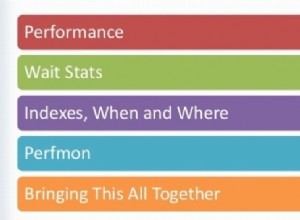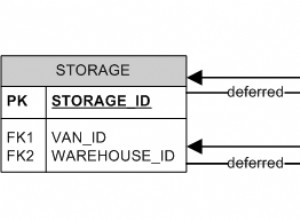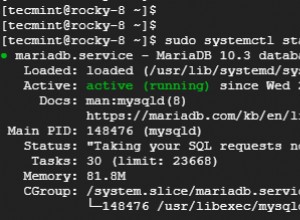Como alternativa al SQL recursivo, también puede usar el MODEL de SQL cláusula. Personalmente, encuentro esto un poco más fácil de leer que el SQL recursivo, aunque es más difícil de escribir (porque la mayoría de las personas, como yo, necesitan buscar la sintaxis).
-- "test_data" is just a substitute for your real table, which I don't have
-- it is just so people without your table can run this example and would
-- not be part of your real solution.
with test_data ( sort_col, addend ) as
( SELECT 'A', 3 FROM DUAL UNION ALL
SELECT 'B', 7 FROM DUAL UNION ALL
SELECT 'C', 6 FROM DUAL UNION ALL
SELECT 'D', 5 FROM DUAL UNION ALL
SELECT 'E', 9 FROM DUAL UNION ALL
SELECT 'F', 3 FROM DUAL UNION ALL
SELECT 'G', 8 FROM DUAL ),
-- Solution begins here
sorted_inputs ( sort_col, sort_order, addend, running_sum_max_15) as
( SELECT sort_col, row_number() over ( order by sort_col ) sort_order, addend, 0 from test_data )
SELECT sort_col, addend, running_sum_max_15
from sorted_inputs
model
dimension by (sort_order)
measures ( sort_col, addend, running_sum_max_15 )
rules update
( running_sum_max_15[1] = addend[1],
running_sum_max_15[sort_order>1] =
case when running_sum_max_15[CV(sort_order)-1] < 15 THEN
running_sum_max_15[CV(sort_order)-1] ELSE 0 END+addend[CV(sort_order)]
)
RESULTADOS
+----------+--------+--------------------+
| SORT_COL | ADDEND | RUNNING_SUM_MAX_15 |
+----------+--------+--------------------+
| A | 3 | 3 |
| B | 7 | 10 |
| C | 6 | 16 |
| D | 5 | 5 |
| E | 9 | 14 |
| F | 3 | 17 |
| G | 8 | 8 |
+----------+--------+--------------------+




